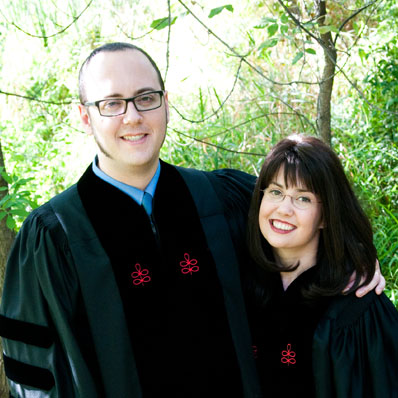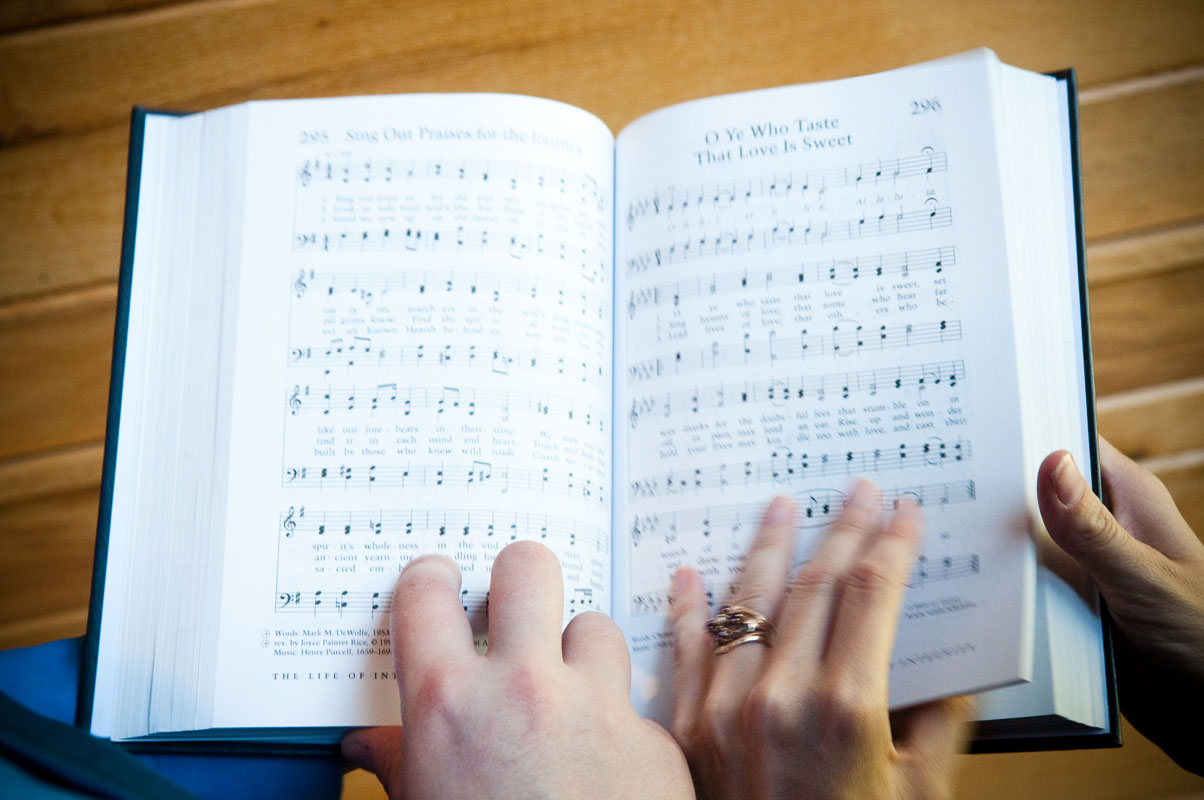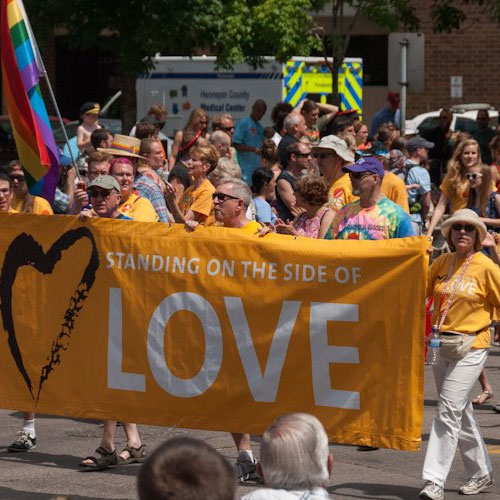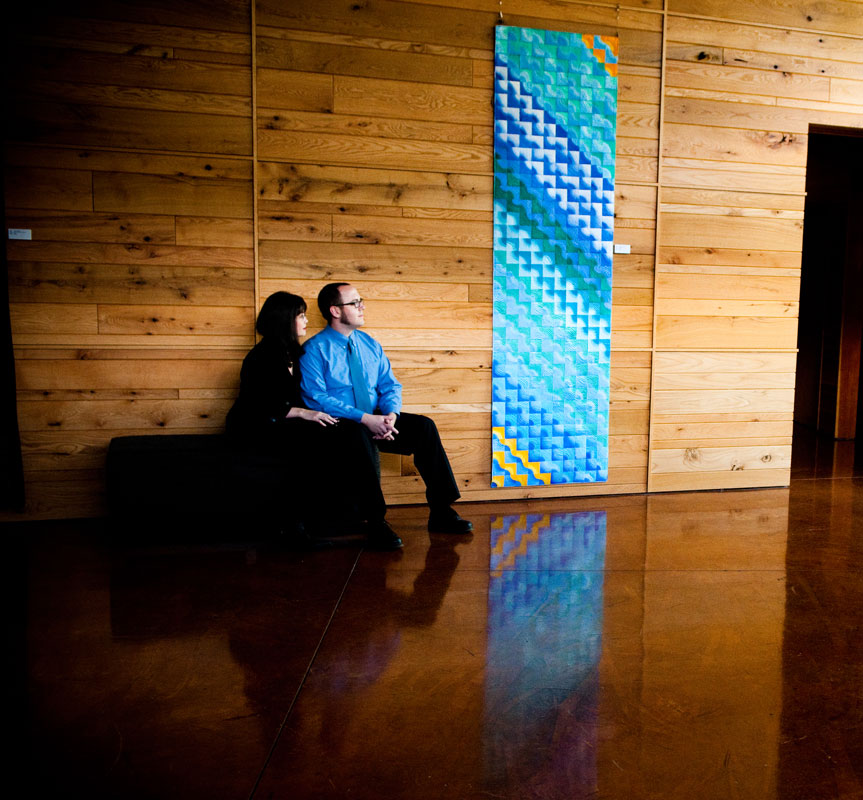Our Ministry

We are a clergy couple, serving the congregation as co-ministery team. We hope to start our ministry with two part-time positions, each half-time, with the intent to grow them into two full-time positions over time. We hope for a ministry in a Unitarian Universalist congregation that is committed to a life of faith—both within and beyond its sanctuary walls. We hope for a ministry in a church that is rooted, practicing, and prophetic.
Rooted
We seek a rooted ministry that knows the sources from which it arises: rooted in our history and tradition; rooted in compassion and love; rooted in experience of the holy and transcendent; rooted in a life-saving message to which all people are invited. To this end, we seek a congregation that wants to commit itself to spiritual development and religious education for all ages. We seek a church community that desires meaningful worship and values aesthetics in the life of the spirit. Cultivating spiritual deepening through practice is a foundation of our ministry. With a strong foundation, we can practice our principles as a faith community.
Practicing
We seek a congregation that aspires to practice its principles in concrete ways. We believe this means creating a welcoming community that values all people. We hope for a church that treasures the child taking its first steps as much as it does the board member who walks sure-footedly through the church halls. We hope for a church where the person arriving late to the service who tentatively sits in the back pew will feel warmly welcomed. We hope for a church that ministers to its long-term members who sit front and center as eagerly as it welcomes its new visitors.
We seek a church that is willing to do what it takes to make people feel welcome—no matter if they use a wheelchair or skateboard, no matter their skin color or ability, no matter their academic pedigree, and no matter the size of their paycheck or the color of their collar.
Prophetic
The great Universalist minister Clarence Skinner asked: "How to turn this old earth into the kingdom of Heaven?" We believe that we are part of a larger whole and have work to do on its behalf. We seek ministry in a congregation that wants to be a force for good in the community in tangible ways. The church we hope to serve will be willing to engage in social justice and bear witness in the public square. We also hope the church is willing to strengthen its connections with its district and the UUA more broadly, as well as other houses of worship in the community.
Growing Together
These are high aims that we hope to nurture and unfold over time. The church we hope to serve may not yet be all it wants to be. That's ok! What's more important to us is that the church we serve shares our aspirations and is willing to step beyond its comfort zone to serve its people—people on both sides of the sanctuary walls.
We hope for a church that is willing to take some risks. We hope for a church that takes its mission in the world seriously, but doesn't take itself too seriously. Humor is pretty important in our lives, and we think that there is much joy to be had along the way. Our work might be serious, but we believe our spirits can be buoyant and tender, and that our path is well worth treading, together.
Worship

Worship is a sanctuary to renew the spirit and a crucible for transformation. Beauty is the language of the soul, and is essential for a vibrant, moving worship experience. As a ministry team, we are committed to high-quality worship. Good preaching is grounded in good scholarship; we seek to craft worship that attends to the intellect and the spirit. When we create a worship service, we weave together music, words, prayer, and silence in a cadence that can center our bodies, engage our minds, and open our hearts. Good worship can gently hold the person suffering tragedy as it can hold the family welcoming new life with delight. We know that on every Sunday our sanctuary holds both joy and woe; we try to create spaciousness in worship that can hold this fullness of life with deep care.
Excellent music and art are keys to powerful worship. When worship is carefully fashioned in a variety of media with theological and aesthetic integrity, it is an invitation to step outside of regular time and into holy time. The ancient Greeks distinguished between chronos, chronological "clock" time, and kairos, a holy time that is set apart. Kairos is a time that is betwixt and between, when something special, something holy might happen. The arts are central to creating a worship experience that can invite us to step outside of the daily routine—the chronos—of our lives to experience the transcendent.
Ritual studies point to the widespread use of the arts throughout the world over the millennia. Current understandings of our neurobiology and physiology further affirm its importance. The arts involve varied senses, for an embodied experience of worship that can transcend mere intellectualism and sentimentality.
We strive for excellence in worship, particularly in collaboration with music directors, choir directors, and musicians with whom we have the pleasure to work. Teri brings the good fortune of years of music study, and David found the church choir of his youth a powerful experience. As a worship team, we deeply value working with musicians to craft a worship service with aesthetic coherence, sensibility, and tenderness. We have seen the crucial role of the arts in large, thriving churches. The arts are worship.
Worship is at the heart of what we do as a faith community; it is the work of the entire church. We have both experienced strong lay leader programs in which members of the church community work together to develop a thematic year that is integrated throughout the life of the church, including lifespan religious education, sermon topics, worship experience, and social justice work.
Liturgy means, "the work of the people." It is a way for the church community to get involved, to make something beautiful together, and to practice our spirituality. Worship is yet another space in which we are dedicated to be responsive to the hopes and history of the congregation. We are committed to cultivating strong programs of arts and music and consistent excellence in worship.
Religious Education
"The great end in religious instruction, is not to stamp our minds upon the young, but to stir up their own; not to make them see with our eyes, but to look inquiringly and steadily with their own; not to give them a definite amount of knowledge, but to inspire a fervent love of truth; not to form an outward regularity, but to touch inward springs."
—William Ellery Channing, 1836
The Whole Church for Whole People
As ministers, we understand that a church is a church for all. People of all ages are both teachers and learners, all ages have gifts. We seek to cultivate religious education across the lifespan and across the whole programmatic life of the church. Religious education teaches UU history, identity, and religious values, but also fosters intergenerational relationships. Relationship is the foundation of ministry, including both formal and informal religious education.
The work in the classrooms and the sanctuary is equally important. And, while much learning happens in those spaces, religious education can happen in unexpected places, like chopping veggies in the church kitchen for dinner! Whether we are in the sanctuary or the classroom, whether we are elders or very young, we are living the same mission. We need one another to learn and grow.
In our role as co-ministers, we will work closely with religious education professionals, staff, and lay leaders to support their work, and to ensure that we have a single, integrated program. We will seek to establish integrated curricula that span the entire life of the church, including worship, church school, adult religious education classes, and social justice work.
Religious Education for Children
We believe strongly that the children of the congregation deserve quality religious education commensurate with the quality the church expects in all other areas of its programming. We are entrusted with the tremendous task of growing souls! As a church community, we pledge ourselves to foster the development and growth of our children. We will work closely with our RE Director to support and develop the RE program to serve our children and youth well.
Yet, we understand that the immense task of the religious education of children is impossible to accomplish in one hour on Sunday mornings or even with an additional two hours on Wednesday evenings. For this reason, we understand that parents are their children's primary religious teachers. Adult religious education is a key to our children's education. Quality adult religious education provides opportunity for spiritual development, theological literacy, religious identity, and provides parents with greater means to be their children's primary teachers. We believe that adult religious education is the foundation for a strong lifespan RE program.
The Method is the Message
As Universalist minister and theological professor Angus MacLean asserted, the method of religious education is the message. As important as our programming is, how we conduct it and how we live as a church community is just as important, if not more so. Religious education should transcend the Sunday school model to be the foundation for the church body.
We learn as much, if not more, by our implicit curriculum than by our formal lessons. How do we argue with one another? How much energy and time is given to our explicit goals? How much of our church resources are allocated for our children? How much of our resources are donated to those in need? Do we use environmentally responsible cleaning products? Do we ask our children to "have your mom and dad sign this," implying the normal family is a straight, two-parent family? Do we only have white dolls? Furthermore, what is our null curriculum—what do we never talk about? Race? Class? What are we teaching one another by our silence? Religious education is not just about what we do, but how we do it, and even what we don't do.
Our philosophy of religious education is to provide appropriate experiences across the lifespan that invite the continual unfolding of the spirit. We understand that education occurs in both formal and informal settings, and that religious education is about what we do, but moreover how we do it. Religious education means teaching where we come from and who we are as Unitarian Universalists. It means a vision of where we are headed and the life we are invited into.
As co-ministers, we have a shared vision for a thriving lifespan religious education program that spans the programmatic life of the church. We each bring particular experience, interests, and gifts. David is a trainer, has studied critical pedagogy extensively, and has preliminary licensure as a public secondary school teacher in the state of Massachusetts. Teri has studied adult development and brings a passion for adult education, and has designed and taught classes for hospital staff and the parish. As parents, we bring deep care and compassion for children of all ages—and their parents!
Religious education is certainly about pedagogy and curriculum—explicit, implicit, and null. But, ultimately, and even more powerfully, it's about being in relationship with one another and having a sense of belonging. That's when we're open to learning, whether we're in the pew—or the chancel.
Pastoral Care

Spiritual care in an age of pluralism
Unitarian court preacher Francis David's sixteenth-century insight rings true today: "We need not think alike to love alike." As ministers, our pastoral approach is informed by this belief. We seek to meet people where they are and accompany them on their journey. This is grounded in profound respect for their faith and story. We understand our role to listen deeply, with care. We companion with another person as they make meaning out of the story of their life and encounter the holy. We seek to be a non-anxious presence, grounded in our own beliefs and practice, and to help the people we serve explore theirs.
Our faith is a plural one; our congregations are filled with people of all different theologies. Our work is to meet them where they are, to help them in their own work to grow their soul and serve the world. We reflect the pluralism of our faith: David's theology is based in his Jewish heritage and humanist beliefs. Teri's theology is rooted in the liberal Christian tradition and fashioned by critical inquiry. Our beliefs and practices ground us and form the foundation of our care for others.
Yet, effective pastoral care is not about our beliefs and experiences—it's about companioning another person on their journey. We support the people we are called to serve in the pastoral encounter. Whether they are walking with Jesus or believe there is no God, whether they carry the burden of a hurtful religious past, or they are unchurched, we bring our deep care and experience to attend to them with compassion and love.
Pastoral care occurs in many shapes and forms. While we might first think of a one-on-one conversation with a minister in her study, we recognize that pastoral care also happens in the fellowship hall and the boardroom. We seek to bring pastoral sensitivity to all of church life; listening with a "third ear" in all the events of life: from the unmistakably spiritual to the seemingly quotidian.
Cultivating spiritual depth
Sometimes our theology gets in our way and no longer serves us well. It can get between us, one another, and even between us and the holy. Spiritual maturity can be borne of many beliefs, but it always requires practice. As ministers, we understand that a component of effective pastoral care is to gently challenge the roadblocks in our spiritual journey. We seek to accurately reflect the reality we encounter and to provide the tools to grow.
We do well to ask ourselves—do our beliefs and practice make us happy, joyous, and free? Are we of greater service to others? Do we know peace? As ministers, it is our job to nurture faith development: in those we serve and in ourselves, too. This requires compassionate, yet critical reflection; it's not always easy, but it's always important.
Our Experience
As co-ministers, we bring a broad skill set to support the pastoral needs of a congregation. While we share a vision for pastoral care, we each bring distinct gifts. As a man and woman with two different personalities, vocabularies, and approaches, we can serve a broader range of people than either of us could alone. We have both completed clinical pastoral education, formal education in pastoral care and counseling, and have hands-on experience providing care in the congregations we have served. We also know the limits of ministerial expertise. We are committed to refer people as necessary to the professional help they may need while we continue to attend to their spiritual journey.
Teri brings extensive experience and deep interest in pastoral care and counseling. To further develop her skills in this area, she pursed advanced coursework in pastoral care while in divinity school and completed additional coursework in psychology beyond her studies in her undergraduate and master's programs. She has completed extensive continuing education on topics ranging from palliative care to fetal and perinatal loss, mental illness, addiction, and grief.
Following her ministerial internship and sabbatical ministry at Unity Church, Unitarian, Teri completed a full-time chaplain residency, and later went on to serve as a hospice and palliative care chaplain at the Minneapolis Veterans Affairs (VA) Hospital. She is eligible for board certification as a clinical chaplain. Teri presently serves as an on-call chaplain in the Allina health care system, attending to patients and their families experiencing medical emergencies.
Prophetic Witness
& Community Leadership

We believe Unitarian Universalism is a voice for justice and has a place as a religious body in the public square. If we take seriously the church mission to grow our souls and serve the world, then we are called beyond the church walls and into the community. As religious liberals, it is important assume our place in the public square: we are women and men whose faith calls us to do something real in the world. We hope to cultivate a church culture that will speak up on moral issues relevant to our shared mission. We will seek to grow the church's prophetic witness through civic engagement, interfaith dialogue, and participation in local media. Furthermore, we hope to be involved with local church and interfaith councils in the community.
Prophetic witness is most effective when it comes from the congregation as a whole rather than an individual minister. There may well be times in which we feel called to speak out on matters of conscience individually in a public manner; this is part of our vocation. Yet, it is our hope to nurture the congregation as a whole to bear witness publically and to serve their broader community in powerful and relevant ways. We can have a much greater impact in the world together.
We also seek to collaborate with our larger UU community. Many problems we encounter as a church have already been solved by someone, and it's as much a matter of finding a partner who has faced the same issue as it is a matter of developing our own unique solution. We will encourage lay leaders to connect to other UUs at the district and national levels. Likewise, we hope to actively participate with UU colleagues in the district and at national conferences—our ties to one another are vital, indeed. That is the basis of our congregational polity—we are congregations in association with one another. As such, each individual church can be stronger when it stands together, when it seeks council from others, when it works together for common aims.
We are institutionalists, through and through. We believe creating systems to develop the health of the congregation is the best way to perpetuate our good work in the world. We have much to gain and share by collaborating with our sister UU congregations. However, the best way we can serve our broader faith is by working for the health and growth of the congregation that we called to serve as co-ministers. Therefore, our primary focus will always be upon our congregation and its members.
Our Commitments

Our Commitment to Professional Development
Our first years as co-ministers in a congregation will be a time of integrating our training and practice as we learn everything that we can about our new community. We bring rich experience to this first settlement: a combined four years of ministry experience in large UU churches, expertise in clinical chaplaincy, and a decade of corporate experience in project management, leading teams, and innovation.
We are conscious that we are at the beginning of our ministry career. We believe that we can best serve our congregation by continuing our training and professional development throughout our ministry. Professional support is key to ministerial success: effective mentorship by a more senior colleague, personal therapy, spiritual direction, and professional coaching. We are committed to pursuing this support both as a team and as individuals.
Furthermore, we pledge ourselves to continuing our professional education. Parish ministry is a profession where it's easy to be isolated; both ministers and congregations benefit from ongoing training and collegial connections to share current research, best practices, and support. Time and resources spent in this way are good investments for the congregation, indeed.
Our Commitment to a Balanced Life
The health of our co-ministry will be contingent upon the health of our relationship. We have cultivated our relationship for over thirteen years and we know how to tend to it with care. We know how to disagree respectfully, how to come to consensus, how to support one another in crisis, and how to navigate overlapping personal and professional responsibilities with grace, and usually with humor!
The health of our relationship requires us to be healthy as individuals. Clergy are prone to overwork at the expense of their own health. Amongst other professions, clergy notably have some of the highest rates of alcoholism, obesity, divorce, and suicide. We take these statistics seriously—they reflect real people, real families, and real congregations. From the outset, we will seek to find a sustainable balance between the rigorous demands of ministry and self-care. We understand that this will necessarily be a dynamic process and we are prepared to be flexible.
We value maintaining an integrated and balanced life. We know that it's not only important to us as people, but as co-ministers the health of our ministry and congregation is at stake. Regular spiritual practice, exercise, and time invested in our relationship with one another, our kids, and rest are the foundations for successful ministry. We will pay close attention to establishing helpful boundaries around integrating our vocation and lives as we move into new positions and, as a family, into a new community.
Moreover, we will lead by example and support our staff and lay leaders as they navigate this terrain in their own lives. A church community that values and champions the importance of their ministers' deliberate investment in development and sustenance will be richly served.
All site content and design by David and Teri Schwartz
